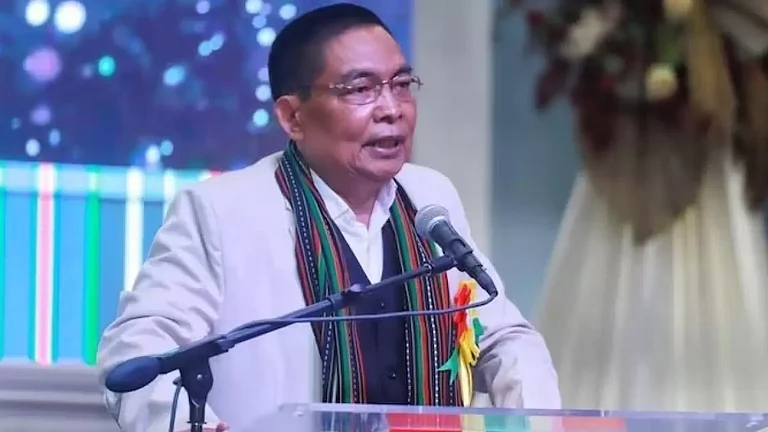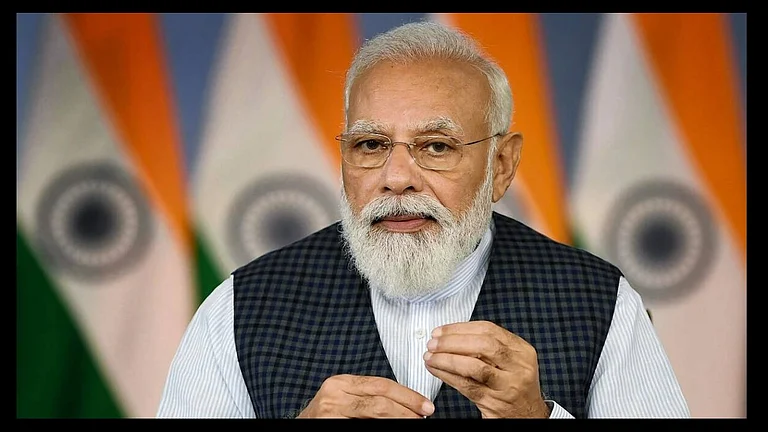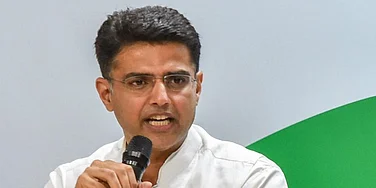When five Manipur Congress MLAs joined the Meghalaya Democratic Alliance (MDA), Conrad Sangma was a happy man. With months to go for the Manipur assembly elections, it was a confidence booster for the president of the National People’s Party (NPP) and Meghalaya chief minister, India’s second youngest. Little did he know that the coming months would turn out to be testing times for him to maintain NPP’s footprint in the northeast.
Sangma’s NPP had enough reasons to want to fight the Manipur polls alone for the first time, outside the NDA. Sangma wanted to prove that NPP deserved to be the first political party from Northeastern India to earn the status of a national party political (it happened in 2019). He also wanted to use this prestige to become the primary lobby for the region’s interests in the Centre. Moreover, his alliance with BJP in two other Northeastern states—Nagaland and Manipur—was always rocky.
Fast forward to March 10. A massive victory for the BJP in the Manipur assembly polls was something not many could foresee. But the news that BJP can sail smooth in Manipur for the next five years is not very good for its former ally NPP.
Much before the final mandate was up on the ECI website, with post-poll alliances yet to be discussed, a cheerful former BJP CM N. Biren Singh announced that his party was willing to keep its alliance with the Naga People’s Front (NPF) intact, but not so with Sangma’s NPP, even though the latter was a BJP ally until a few months ago.
Right after his thumping victory from Heingang constituency against Congress’s Pangeijam Saratchandra Singh by 18,271 votes, Biren Singh said, “I don’t think NPP will be a part of the government, but NPF won’t harm the “coalition dharma”.
NPP, a party born in Manipur and raised in Meghalaya, had emerged as a ‘kingmaker’ in the Manipur Assembly polls of 2017. With its four legislators, it had helped BJP form government when the latter was stranded at 21 against the Congress’s 28.
In 2023, three Northeastern states—Meghalaya, Nagaland and Tripura—will go to polls. In Meghalaya, BJP has been backing the NPP-led Meghalaya Democratic Alliance (MDA) since the 2018 Assembly polls. In February, the opposition Congress joined the alliance, after 12 of its MLAs jumped ship to new entrant Trinamool Congress (TMC).
NPP indirectly took credit of the fact that it could bring two arch-rivals—Congress and BJP—together on one platform. However, party insiders say BJP leaders in Meghalaya were not upbeat about Congress joining the government.
But NPP’s latest poll debacle in Manipur can have a negative impact on its alliance in Meghalaya. For the party which has to fight two polls in 12 months, a double-digit score and a stake in the Manipur government—be it with Congress or BJP—is much needed.
Even though it managed to emerge as the second largest party by securing 7 seats, let’s not forget that it had fielded 38 candidates this time, against 4 seats won from 9 candidates in 2017. Not being part of the Manipur government makes it look weaker. Given BJP’s history of toppling governments by horse-trading MLAs from smaller parties, the upcoming Meghalaya assembly election is going to be tricky for the regional power.
The fiasco will also have an impact on the next Nagaland assembly polls. For the first time, the NPP had fielded candidates in all 11 constituencies of the Naga-dominated hill areas in Manipur, along the Nagaland-Manipur border. The sole aim was gaining a bigger footprint among Nagas in time for the Nagaland polls early next year. However, it managed to bag only two seats there, with most seats going to NPF.
Along with campaigning in the Manipur polls, Meghalaya-based NPP leaders have frequently travelled to Nagaland to assess the ground situation and strengthen its organization in the state. In the 2018 Nagaland assembly polls, two NPP candidates had won, although both later shifted to Nagaland CM Neiphiu Rio’s Nationalist Democratic Progressive Party (NDPP). Right now, Nagaland has an opposition-less government as all opposition parties and independent MLAs resolved to support the government under the umbrella of United Democratic Alliance. The NPP was supposed strengthen its prospects for Nagaland by first winning big in Manipur’s Naga Hills.
Dhiren A Sadokpam, editor-in-chief of Frontier Manipur and a political analyst, says, “If NPP is out of the BJP-led coalition in Manipur, it may send an unfavourable message—inability to be part of the ruling dispensation—to NPP members in the rest of the Northeast. So, it will be mixed-blessings for NPP’s expansion plan elsewhere in the Northeast.”
Another factor that NPP is dealing with is Trinamool Congress’s increasing inroads in the Northeast. Already, Meghalaya’s opposition leader Mukul Sangma along with 11 other legislators, have joined the West Bengal-based party. It won’t take much time for NPP MLAs to jump ship to TMC at the slightest hint of instability for the NPP.
Meanwhile, Conrad Sangma’s recent announcement—that Meghalaya was withdrawing its consent for CBI to carry out investigations in the state without the state government’s permission—has further destabilised its coalition with BJP in the state. With this announcement, Meghalaya joins eight other states to say no to CBI inquiry without consent. The point to be noted here is that all the other states are ruled by the opposition. BJP insiders say this has irked many at the Centre, as well as some BJP legislators within the alliance.
Babloo Loitongbam, social scientist and adviser of Youth Collective Manipur, which has been closely monitoring the elections, including the associated violence, said, “Even though NPP is not part of the government now, it can still play a vital role as a good opposition. It is an opportunity for the party to work closer with the people. If they are thinking of the long term and if they aspire to be a political force at the Centre, NPP must play its role of a responsible opposition.”
The reasons why BJP still wants its former alliance partner Naga People’s Front (NPF) with it, despite getting two seats more than what is required to form a majority government, are quite obvious. Talking to reporters, Achumbemo Kikon, NPF’s secretary-general said, “It is imperative for any government, including the BJP, to have NPF as an ally, in order to ensure that peace prevails in both the hills and the valleys. It is only through NPF that the gap between the hills and the valleys of Manipur can be bridged.”
NPF has already submitted its letter of support to a BJP government in Manipur. It has won 5 out of the 10 seats it fought over, all in the Naga Hills.
NPF’s journey with BJP in Manipur has not been the smoothest either. In 2019, it had threatened to pull out of the alliance, alleging that “since the formation of the government in 2017, it had never respected the spirit of the alliance”.
However, no party, not even BJP, can sustain a government in Manipur without the support of NPF. According to Dhiren A. Sadokpam, “On the one hand, keeping NPF as an ally of BJP in the post-poll scenario would directly or indirectly boost the confidence of the Nagas of Manipur vis-a-vis the protracted Naga political imbroglio beyond territories. On the other hand, NPF’s contribution in both Nagaland and Manipur in pacifying Naga hardliners comes as the most feasible political pragmatism. However superficial the relationship may look, it still works to the benefit of both BJP and NPF.”
The BJP-led Centre has been facing pressure from NPF to repeal the Armed Forces Special Powers Act (AFSPA), which has been in place since 1958. The demand intensified after 14 civilians were killed by security forces in Nagaland’s Mon district in December 2021. But days later, the Centre extended AFSPA over Nagaland. It led to widespread protest, in which both Meghalaya CM Conrad Sangma of NPP and Nagaland CM Neiphiu Rio of NDPP criticised AFSPA in strong words. And yet, a month after Nagaland, AFSPA was also extended over Manipur for one more year, i.e. till December 1, 2022.
Interestingly, BJP’s election manifesto did not utter a single word about AFSPA. When asked about it, CM N. Biren Singh claimed the BJP-led government was working towards a favourable ground situation before it could repeal AFSPA in Manipur.
BJP knows that if it is to rule in a state like Manipur and maintain AFSPA—what with the additional headaches of the divide between the hills and the valley, periodic bandhs and blockades, and an ongoing armed struggle—the best thing to do is to keep regional parties on the side of the government.
“There are more reasons than numbers. Without the help of the NPF, it would be very difficult for BJP to manage the administration in the hill areas, which are prone to protests and blockades. So this kind of power-sharing is actually beneficial for the BJP,” said Loitongbam.





















